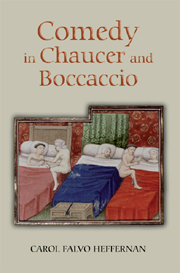Book contents
- Frontmatter
- Contents
- In memory Of Thomas Farel Heffernan 1933–2009
- Preface and Acknowledgments
- 1 Introductory matters
- 2 The Comic Inheritance of Boccaccio and Chaucer
- 3 Parallel Comic Tales in the Decameron and the Canterbury Tales
- 4 Antifraternal Satire in Boccaccio and Chaucer
- 5 Adding Comedy: Boccaccio's Filostrato and Chaucer's Troilus and Criseyde
- Conclusion
- Bibliography
- Index
- Chaucer Studies
2 - The Comic Inheritance of Boccaccio and Chaucer
Published online by Cambridge University Press: 12 September 2012
- Frontmatter
- Contents
- In memory Of Thomas Farel Heffernan 1933–2009
- Preface and Acknowledgments
- 1 Introductory matters
- 2 The Comic Inheritance of Boccaccio and Chaucer
- 3 Parallel Comic Tales in the Decameron and the Canterbury Tales
- 4 Antifraternal Satire in Boccaccio and Chaucer
- 5 Adding Comedy: Boccaccio's Filostrato and Chaucer's Troilus and Criseyde
- Conclusion
- Bibliography
- Index
- Chaucer Studies
Summary
That we still read the comic tales of Boccaccio's Decameron and Chaucer's Canterbury Tales and have lost or forgotten those of many other medieval writers is partly an accident of history but mostly a testament to the art of the two fourteenth-century authors, one, the foremost spokesman of humanism that appeared in late medieval – or, as Italian scholars prefer, early Renaissance – Italy and the other, a poet who gave his name to a golden period in early English literature, the Age of Chaucer. Boccaccio's comic novellas and Chaucer's fabliaux recreate and make us laugh at the sights, sounds, smells, and, most of all, the voices of fourteenth-century European country and town life. Their tales contain no heroes, just characters whom we recognize as ourselves – no better, possibly worse. When we read the comic tales of each of these writers we “surrender to lower faculties” for a time and forget the “serious affairs of life.”
Although the distinctive individual talents of Boccaccio and Chaucer are what keep their tales alive while those of other medieval writers are long forgotten, their comic narratives are, nonetheless, part of a continuum that reaches back into the comic spirit of antiquity. This chapter will explore ideas about comedy and comic works that would have been available to both fourteenth-century writers. The texts that I cite in this chapter arose at different times in response to different social, cultural, and aesthetic pressures; some of them were far better known than others, some were hardly known at all.
- Type
- Chapter
- Information
- Comedy in Chaucer and Boccaccio , pp. 20 - 37Publisher: Boydell & BrewerPrint publication year: 2009



